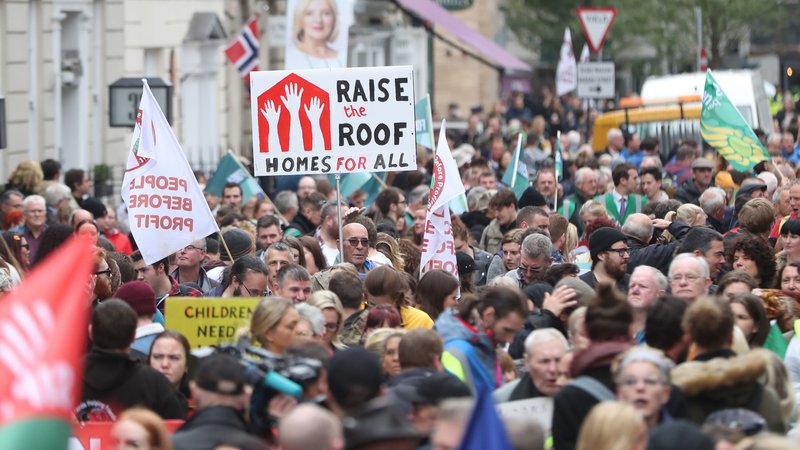Renters across Ireland recently woke up to the news that the entirety of the 26 counties now falls under a Rent Pressure Zone (RPZ).
Was Micheál Martin visited by three ghostly figures who awoke him to the suffering of tenants across the country? What else could have prompted him and his Housing Minister James Browne to enact nationwide rent controls?
A Fig Leaf for Increased Rent
Alas, what we have here is a mere trick of the eye. RPZs have been extended from encompassing 80 to 100 percent of the South of Ireland, yes, but their meaning will change fundamentally from March 2026.
No longer will landlords be forbidden (at least on paper) from increasing rents by more than 2 percent or the rate of inflation. They will now have the ability to raise rent to whatever the market will bear every 6 years of a tenancy – or earlier if a tenant leaves ‘voluntarily’.
The rate at which rents are skyrocketing will therefore receive an even greater push. Those renting on a seasonal basis such as students can expect to pay the highest rate possible with each new tenancy. And in fact landlords will be incentivised not to meet basic standards because if you find your living conditions unbearable and ‘choose’ to move elsewhere, your landlord will be rewarded with the ability to raise the rent for the next tenant!
The silver lining, we are told, is a new ‘ban’ on no-fault evictions. But this is only a feeble echo of even the eviction ban that existed two years ago. ‘Small landlords’ will be allowed to carry out no-fault evictions every 6 years. If that’s not enough, they can do so earlier if, for example, a family member wishes to move in.
But even these generous conditions won’t discourage the craftiest among them, considering it’s precisely this cohort, which owns the homes of 45 percent of renters, that are the most notorious offenders when it comes to illegal evictions.
The Supply Puzzle
So what has possessed the government to respond to ballooning rents by granting landlords additional powers to enact rent increases? Their perverse logic goes that if there is more money to be made from ripping off tenants, then investors will be inclined to build more homes.
The reform may not have been inspired by any Dickensian spectres after all, but the Ghost of Housing Future did rear its head eventually in the form of a new report by the Central Bank of Ireland.
Despite the new measures, the central bank has reduced its previous projections for housing completions in the years ahead. They now expect 32,500 units in 2025 – a far cry from the 50,500 completions per year needed to reach the government’s promise of 303,000 new homes by 2030.
Capitalism’s justification for its existence is that market signals are supposed to incentivise competing capitalists to pump investment where the greatest demand exists. And yet housing commencements for the first quarter of 2025 were at their lowest level since 2016! How is our landlord government to square this circle?
Housing completions are dependent on a plethora of factors, including the cost of construction (which is rising), the availability of labour (at an all-time low) and the state of infrastructure such as water and electricity (in utter crisis).
The government can try to address these various shortfalls with state investment, but where is this money to come from? With growing instability in the Middle East and no progress on ‘zero-for-zero’ tariffs between the US and EU, global trade is about to suffer further crushing blows which threaten to put an end to the era of surpluses for the Irish exchequer.
For a Revolutionary Housing Policy!
The reforms to RPZs due to be enacted in March amount to a massive attack on workers and tenants across Ireland. We must fight tooth and nail for a real ban on evictions and for rents to be capped at a proportion of income.
These are demands that would immediately benefit workers and tenants, and communists support them. But more is needed to solve the housing crisis. James Connolly explained it all the way back in 1899:
“It must be remembered, however, that all those measures are merely tentative. Our cities can never be made really habitable or worthy of an enlightened people while the habitations of its citizens remain the property of private individuals. To permanently remedy the evils of city life the citizens must own their city.”
Even with the increased squeeze tenants will now experience, supply will continue to be insufficient.
What is needed is to nationalise and unite the existing construction firms. Furthermore, the Irish state has recently relinquished the last of its AIB shares from the 2009 bailout. We propose the exact opposite – expropriate the colossal wealth of the banks without compensation to the profiteers!
Only with real, direct control of the building sector and the wealth to carry out a plan of mass infrastructure construction, could the demand for housing finally be met – not as material for speculation but as the affordable homes that the working people of this country desperately need.




